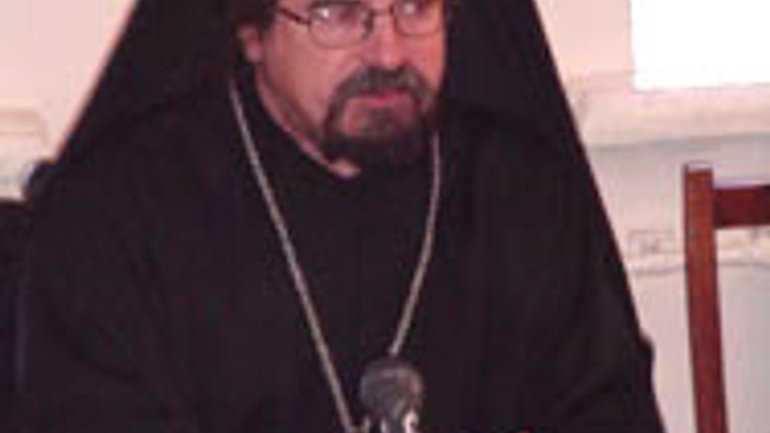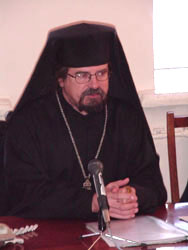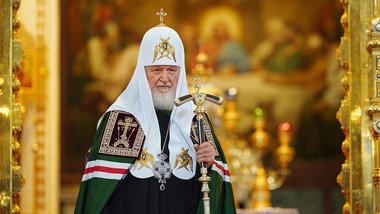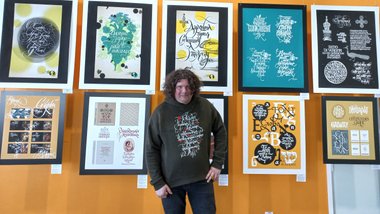Interview with Archbishop Ihor (Isichenko)

“The Church's Priority Must be the Salvation of the Souls of the Community of the Faithful”
Interview with Archbishop Ihor (Isichenko) of Kharkiv and Poltava (Ukrainian Autocephalous Orthodox Church)
 – At the National Sobor [Assembly] in 2000, Metropolitan Constantine (Kostiantyn) of the Ukrainian Orthodox Church USA [UOC-USA] appointed you as his representative in Ukraine, that is, he divided the power. Officially, the church has a local head in Ukraine [Metropolitan Mefodii (Kudriakov)], but there is also a representative of Metropolitan Constantine, who is the ultimate head of the church. How have the relations of the UOC-USA with Constantinople been since that time? Have you felt some pressure, that you are doing something incorrect, or that somehow they don't understand you there?
– At the National Sobor [Assembly] in 2000, Metropolitan Constantine (Kostiantyn) of the Ukrainian Orthodox Church USA [UOC-USA] appointed you as his representative in Ukraine, that is, he divided the power. Officially, the church has a local head in Ukraine [Metropolitan Mefodii (Kudriakov)], but there is also a representative of Metropolitan Constantine, who is the ultimate head of the church. How have the relations of the UOC-USA with Constantinople been since that time? Have you felt some pressure, that you are doing something incorrect, or that somehow they don't understand you there?
- After I received the decree from the metropolitan about my appointment, I requested our bishops in the USA to give me advice. I asked them to bring it to my attention immediately if I did something incorrect. And with gratitude I recall that at critical moments Metropolitan Constantine found ways to influence the course of events in Ukraine. As a bishop of the Patriarchate of Constantinople, however, he does not have absolute freedom in his contacts with the Ukrainian Autocephalous Orthodox Church (UAOC), since our community has not established official relations with the Patriarchate of Constantinople. So he cannot give official instructions regarding the Ukrainian Church. And, in addition, His Beatitude, being an exceptionally delicate person, has tried not to interfere in matters that can be taken care of without him. The Patriarchate of Constantinople, after the Ukrainian Orthodox Church-Kyivan Patriarchate [UOC-KP] appealed to it, has sensed an opportunity for more effective participation in overcoming the tragic split that exists in Ukrainian Orthodoxy and has lost interest in one-sided contacts with the UAOC.
Unfortunately, the Moscow Patriarchate has found an effective way to counter the assistance of the Ecumenical Patriarchate [of Constantinople]. On the one hand, the anarchic traditions in the Ukrainian churches have in different ways been nourished. This has ruined the means of increasing contacts with the Ecumenical Patriarchate. On the other hand, the Moscow Patriarchate, and in particular its External Church Relations Department, headed by the experienced and smart politician Metropolitan Kiril, has made exceptionally successful and underhanded progress. The Russians did not openly counter the relations of Constantinople with Ukraine. They agreed to hold discussions about the future of the Ukrainian Church. But gradually they have forced out of the discussion those very Ukrainian churches whose future is being discussed.
So, after this, the discussions between the Constantinople and Moscow patriarchates gradually lost meaning for the churches in Ukraine. This has been evident since 2001 and has led to a very radical reaction from Patriarch Filaret of the UOC-KP. Contrary to the agreement signed in Constantinople on 8 November 2000, he has ordained bishops and continued to form an eparchy of the UOC-KP in North America. The UAOC, which has significantly more limited possibilities for independent action, has not taken similar steps. But at that same time, “whisperers” have appeared, who have advised the local head [Metropolitan Mefodii], who was chosen to carry out contacts with the government, that he has too few rights, that he should expand his authority, that he should subordinate the patriarchate to him. I was chosen by the Sobor as administrator of the UAOC Patriarchate and appointed by decree of the supreme head of the church [Metropolitan Constantine]. In the end, this led to a state of affairs such that the leadership of the UAOC was centered in one pair of hands [Metropolitan Mefodii] and ceased to consider the thoughts of Metropolitan Constantine. This, obviously, caused the alienation of the church in Ukraine from its center in the USA and did not suit our parishes in eastern Ukraine, which agreed to enter the UAOC only when it lost its local Galician character, appointed Mstyslav as patriarch, and went under his mantle.
The Kharkiv-Poltava eparchy, the UAOC Patriarchate of the Kyiv region, and communities connected with them belong to the UAOC led by Metropolitan Constantine. If Metropolitan Constantine is not the head of the UAOC, then this is already a different church, which has nothing in common with the UAOC of Metropolitan Polikarp and Patriarch Mstyslav, and this should be openly stated.. This change in relations with the Galician bishops of the UAOC, after their solidarity with the local head of the UAOC in Ukraine, will by no action affect our relations with His Beatitude Metropolitan Constantine. All of his decrees, whether oral, if it will be forbidden to publicize them, or written, will be carried out, without fail, by the UAOC Patriarchate and the Kharkiv-Poltava eparchy. But we all should understand that the priority for the church in Ukraine must not be church politics, neither defense of the interests of the Ecumenical Patriarchate or the UOC-USA that is dear to us, but the salvation of the souls of the community of the faithful who are under the spiritual care of the UAOC in Ukraine. The structure of the church, even its relations with other churches, cannot overshadow the basic identity of the church as an instrument of salvation. Leading to Christ those people who have accepted the UAOC as their church must be the inarguable priority. And, looking on this priority, we in the east of Ukraine want to build up our position in interchurch relations. If it should turn out that the UOC-USA and the UAOC in the diaspora will not be able to maintain contacts with Ukraine, this will happen solely as a disoriented consequence of erroneous information, or simply they will not have courage and will suddenly want to cut off relations with us. We will then, somehow, be forced to change the forms of our jurisdiction. But we most certainly do not want to do this.
The Kharkiv-Poltava eparchy has never betrayed the UAOC, Patriarch Mstyslav, Patriarch Dymytrii, or his successor. All our modern parishes were created in the boundaries of this church, they never went anywhere [to other jurisdictions], and now the faithful remain there. If the UAOC in the diaspora suddenly rejected us, that would be a different situation. But I have faith in the wisdom, the honesty of our episcopate, and that the Ukrainian bishops, even those far away across the ocean, remember us, pray for us, and feel, even with all the jurisdictional complexities of this time, a spiritual link with Ukraine.
In the end, this is all set in documents. But when, after the union of 1995, a permanent conference of Ukrainian Orthodox Bishops in the diaspora was created, in the first of its resolutions it became clear that the UOC in Canada, then the UOC in the USA and the UAOC in the diaspora, went under the mantle of the Ecumenical Patriarchate because they were called by the desire to create a single national Orthodox Church in Ukraine, to assist in the canonical recognition of Ukrainian Orthodoxy. We have faith in this, we believe in the sincerity of the Ukrainian Orthodox bishops in the diaspora, and so we continue in humble expectation of their recommendations, decrees, and instructions.
– Your excellency, recently changes have been noticeable in the meetings of the Moscow and Constantinople patriarchates. Once, controversial questions were at the center of attention. For example, already the “Ukrainian” question has ceased to be controversial, that is, regarding the status of the UOC-Moscow Patriarchate and the so-called “schismatics.” The last meeting, in the beginning of July 2003, as the Moscow Patriarchate confirms, happened at their initiative. This was because of attempts on the part of the government to create some ecclesiastical canonical autonomy, and the church was disturbed that this was not autonomy under the control of the government. At this meeting, the question was also raised about relations with so-called “schismatics.” In particular, the idea was proposed that they should be divided into those with whom some discussion can be conducted and those whose moral standing does not allow any discussion. Patriarch Filaret recommended that this was, in fact,an underhanded attempt to split the UOC-KP and the UAOC. He understands all too well that he falls into the second category, those with whom no cooperation whatsoever is possible. What is your assessment of this act, such a statement?
– From the very beginning, I considered it most necessary that we expect the Ecumenical Patriarchate to create a commission to assess the canonicity of hierarchical ordinations. We will never get beyond mutual accusations of non-canonicity if we do not receive an unbiased, authoritative assessment on the part of those church institutions which are endowed with indisputable authority in the Orthodox world. I hope that, finally, this will happen. And I think that the assessments of each bishop of Ukraine, including the UOC-MP, will take into account the appropriateness of the standing of this person by various canons that relate to bishops, including if he was appointed through the participation of the government, if he was appointed through bribery, is he a drunkard or unchaste. Many of these are in the canons, and it will be necessary to check over all of this, and not just the question of who, where and when this particular person was ordained.
I don't think that the Ecumenical Patriarchate is guided by the recommendations of the Moscow Patriarchate, even if they are playing a game with Moscow that is not clear to us. Neither do I think that the stifling of discussions about Ukraine was arranged by them, that the decisions have already been made, and that the participants of the discussions will only carry out these decisions. Somehow, it seems to me that there's no way we should expect any new, constructive ideas from the Constantinople-Moscow discussions, at least until 2004. Inasmuch as the positions of the current presidential administration are already well know in Moscow, and in Constantinople, and, inasmuch as it can be understood from all this that this does not suit either the Moscow or the Constantinople Patriarchate, so another possibility for development of these relations will be looked for from a future administration of Ukraine, which will be formed after the elections of 2004.
Constantinople and Moscow have still one more subject for discussion, in addition to Ukraine. Let's say, the fate of the Russian archeparchy of the Ecumenical Patriarchate in Western Europe. And there's the still wider problem of the Orthodox diaspora. In particular, the problem of uniting various national Orthodox eparchies in the USA into one national Orthodox church remains very sharp. The Moscow Patriarchate took the first steps towards this some time again, when in 1970 they arbitrarily granted autocephaly to the Russian archeparchy in the USA. Last year the North American Metropolitanate of the Antiochian Church attained autonomy. There is a campaign going for the Greek Church in the USA to achieve widespread self-rule from the jurisdiction of the Ecumenical Patriarchate. And this would mean that the great majority of the real parishes of the Ecumenical Patriarchate would leave it.
This process, of course, also involves the Ukrainian churches in the diaspora and will show their active or passive stance to church problems in Ukraine. Much depends on this: if the Ukrainian churches in the USA and Canada enter into a future national Orthodox church in the USA or if they enter into a single Ukrainian national church. This will depend not only on the leadership of our national Orthodox church and the fate of the Ukrainian community in the diaspora, but on relations among the various Orthodox churches. In particular, there is the question: will the Moscow Patriarchate dominate in the future Orthodox community of the world or will the Ecumenical Patriarchate, for whom the Ukrainian policy would become a decisive test?
Interviewer: Taras ANTOSHEVSKY
Lviv, July 23, 2003








